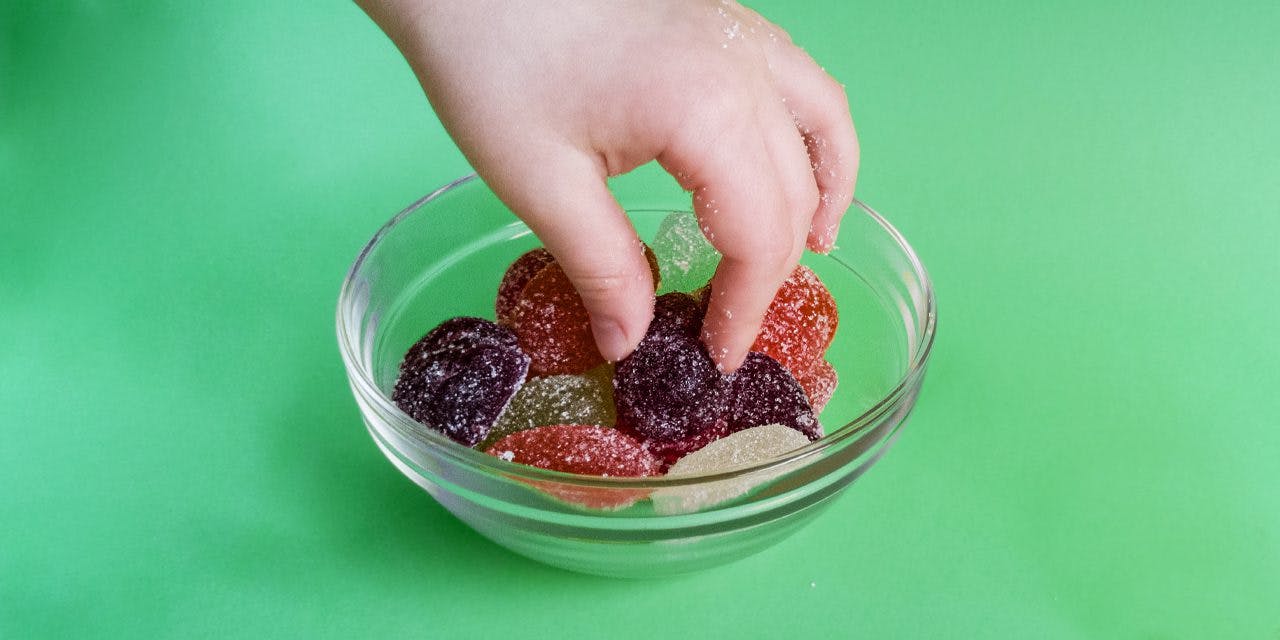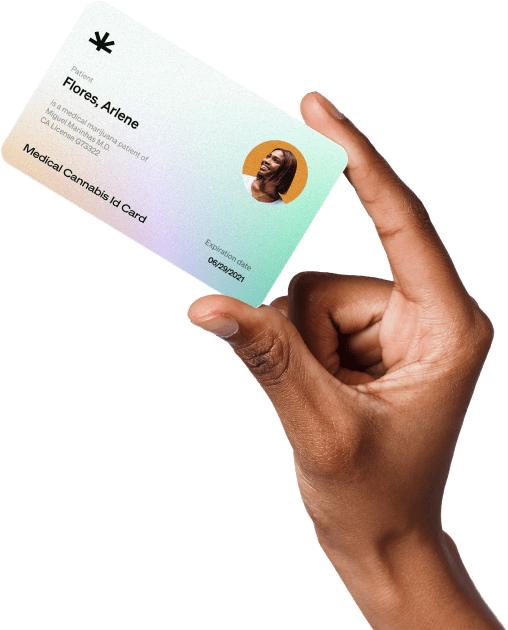Kids and Edibles: What Happens If a Child Eats Edibles?

Article written by

Mike ReddyContent Strategist
Content reviewed by

Dr. Lewis JasseyMedical Director - Pediatric Medicine
The appearance of some edible cannabis products can be nearly identical to their non-THC-infused counterparts. Consequently, for as long as there have been cannabis edibles, there have been tales of friends and family members unwittingly consuming them — children included.
Some states have instituted regulations to ensure that the packaging and shape of cannabis-infused edibles are not attractive to children. However, the idea of tucking into their parents’ “secret stash” is often something that appeals to kids.
As access to cannabis for recreational and medical use increases, so does the number of parents with cannabis edibles that resemble tempting regular candy and baked goods at home. A study published in the journal Pediatrics illuminated key findings surrounding kids and edibles:
- 7,043 cases of young children (under six years old) consuming cannabis products were reported to the National Poison Data System from 2017 to 2021.
- 90.7% of exposures occurred in the children’s own homes.
- 22.7% of cases resulted in hospital visits.
- No deaths were reported during the five-year study period.
While it’s reassuring that no deaths resulted from children accidentally ingesting marijuana products, some exhibited severe symptoms. Nearly 10% experienced vomiting, 3.1% experienced respiratory depression, and 1.6% experienced seizures, to list a few.
Young children’s smaller weight, the study said, puts them at higher risk for increased toxicity from tetrahydrocannabinol (THC), especially considering they may consume more than one serving or dose that an adult might typically take.
In light of these findings, whether you have young kids or maintain close relationships with cannabis-consuming parents, it’s essential to know what to do if a child accidentally consumes edible products.
Get your medical marijuana card
Connect with a licensed physician online in minutes.
What to Do if Your Child Eats an Edible
From chocolate bars and cookies to gummy bears and brownies, edible cannabis products have a long history of mimicking the regular candy and baked goods that many of us, especially children, love.
Pair that with the fact that 21 states and Washington, D.C. have legalized adult recreational use of marijuana — with 37 states having programs in place for its medical use — and it makes sense that these edible forms of cannabis have become increasingly popular in recent years.
So what do you do if they fall into the wrong hands?
First, it’s helpful to determine how much THC — the primary active ingredient in cannabis — the child could have consumed. That information could help healthcare providers or poison control centers determine the most suitable treatment options.
Regardless of the dosage consumed, however, some medical professionals advise parents to take their children to a doctor immediately. Of the 7,043 cases tracked by the National Poison Data System from 2017 to 2021, 2,550 were treated or evaluated by an emergency department.
A little over 13% of cases had no clinical effects, more than half (53.3%) had minor to moderate effects, and 2.2% had major effects that may have resulted in more serious treatments. The five most common forms of therapies used in the nearly 5,000 cases with known outcomes were:
- Intravenous fluids (20.7%)
- Dilution/irrigation/washing (10.9%)
- Food/snacks (10.3%)
- Oxygen (4.0%)
- Benzodiazepines (2.2%)
In rare cases, the use of ventilators or noninvasive ventilation was administered to patients (0.7% and 0.1% of cases, respectively).
What Happens If a Child Eats Edibles?
The cannabinoids in cannabis edibles affect children similarly to adults in that they interact with the body’s endocannabinoid system (ECS). Where things differ, however, is children are more sensitive to psychoactive cannabinoids such as THC. Because the ECS is involved in brain development, these cannabinoids could harm children if consumed regularly and in large doses.
A one-off, low-dose THC exposure is unlikely to harm most healthy children. And in small, calculated doses, non-intoxicating cannabinoids such as cannabidiol (CBD), cannabigerol (CBG), and cannabichromene (CBC) have been used in treatments for childhood epilepsy, cancer, autism, and attention deficit hyperactivity disorder (ADHD). Indeed, when appropriately dosed and under supervision, THC can be utilized for children with serious diseases as an alternative to stronger prescription painkillers.
As with accidentally taking any other medication, parents should execute their best judgment and consider contacting poison centers or taking their child to the emergency room if they accidentally consume edible products.
Can I Give My Kids Edibles?
It is illegal for anyone under 21 to consume recreational marijuana throughout the United States, and providing drugs to your child is a crime in almost all states (which could rise to the level of a felony if certain conditions are met).
Therefore, edible forms of cannabis may only be given to children legally within the legal framework and guidelines of a state’s respective medical cannabis program.
Take time to review and understand your state’s medical cannabis laws, especially regarding issuing medical cards to — and marijuana use by — minor patients. If you believe your child may be a good candidate for medical cannabis, and your state allows minors to apply for a medical cannabis card, you may be able to get them certified online with Leafwell. Please note that patients under 18 will need a caregiver to apply for a medical marijuana card.
How to Store Cannabis Safely Away From Kids
Some states require cannabis products to be sold in child-resistant packaging, but there are additional steps you should take to keep cannabis products away from kids.
Keep edibles and other cannabis products out of sight and out of reach of young kids. Ideally, store them in locked containers inaccessible without a code or key. Additionally, don’t consume edibles when children are present.
These small steps can go a long way in preventing the accidental ingestion of weed edibles and help avoid unwanted calls to poison control centers.
Get Your Medical Card
Connect with a licensed physician online in minutes.
Frequently Asked Questions
Can kids take CBD edibles?
The safest way for children to take marijuana edibles, whether they’re marketed as solely containing CBD or not, is with a valid, state-issued medical card and the guidance of a healthcare provider.
Taking those steps will help ensure the treatment is appropriate. And because many CBD products contain trace amounts of THC, it will also help protect parents or legal guardians from accusations of unlawfully providing THC to a child.
Are edibles OK for 13-year-olds?
Small, calculated doses of cannabinoids — especially non-intoxicating cannabinoids like CBD, CBG, and CBC — have been used to treat children diagnosed with epilepsy, cancer, autism, and attention deficit hyperactivity disorder (ADHD). In several states with medical marijuana programs, minors in the 13-year-old age group may qualify for a medical card and legally consume edibles. However, it is illegal for 13-year-olds to consume edibles without a state-issued medical cannabis card.
